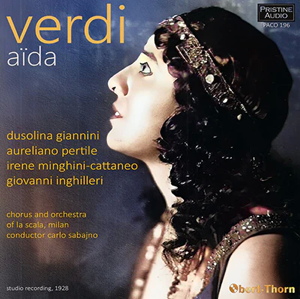
Giuseppe Verdi (1813–1901)
Aïda, opera in four acts (1871)
Aïda – Dusolina Giannini (soprano)
Radamès – Aureliano Pertile (tenor)
Amneris – Irene Minghini-Cattaneo (mezzo-soprano)
Amonasro – Giovanni Inghilleri (baritone)
Ramphis – Luigi Manfrini (bass)
Il Re di Egitto – Guglielmo Masini (bass)
Un Messaggero – Giuseppe Nessi (tenor)
Sacerdotessa – Cantoni (soprano)
Orchestra & Chorus Teatro alla Scala/Carlo Sabajno
rec. 1928, Teatro alla Scala
PRISTINE AUDIO PACO196 [141]
This was the first inclusion in my 2019 Aida survey and was one of two landmark recordings issued in 1928. The other conducted by Molajoli had already been remastered by Pristine back in 2011, when I reviewed it very positively and reproduced that review in the survey. Ultimately – and against received opinion, as per Tully Potter’s notes here – I chose the Molajoli version as the best historical choice especially for Arangi-Lombardi’s assumption of the eponymous leading role, despite HMV’s Lindi being inferior to Columbia’s Aureliano Pertile, but this one under Sabajno also has so much to commend it, not least Pertile’s presence and the surprisingly good sound, now further enhanced by Mark Obert-Thorn’s remastering.
I quote here my verdict on this recording in that survey, as I have no reason to change my opinion:
“The two rival companies of HMV and Columbia each recorded Aida in late 1928. This one from HMV was originally issued on 19 double sided 78 rpm records, a month before the rival Columbia version. The main attraction here is Toscanini’s favourite tenor, Aureliano Pertile. His fast vibrato and light timbre can sometimes be suggestive of a bleat, but the power and accuracy of his delivery soon dispenses any hint of the tenorino in his voice. His ‘Celeste Aida’ is belted out without a hint of nerves, concluding with a ringing B flat. He dominates ensemble heroically. Every voice here has that fast pulse characteristic of the age and I like it; it’s very satisfying to hear two basses devoid of wobble. Minghini-Cattaneo was a major artist, better remembered today than the Aida here; I love the way she dives into her lower register and like Pertile sings with complete confidence and security, with nary a slide or nudge. That cannot be said of the violins we hear first in the prelude, which are screechy and portamento-indulgent, but I tend to think of that as different kind of period authenticity. The trumpets and chorus in the Triumphal Scene are really impressive and the conclusion is thrilling. You have to stop and think: we are hearing something over ninety years old recorded a mere fifty-seven years after the premiere. American soprano Dusolina Giannini was from a musical Italian immigrant family and raised in Philadelphia. She has a big, mostly very even voice which occasionally turns rather unsteadily shrill and piping up top – or perhaps that is the result of the electrical acoustic, which is surprisingly clear for so old a recording, some surface noise and hiss notwithstanding. She is rather harried by Sabajno’s sometimes insanely impatient but exciting tempi, but she is completely on top of the role, particularly impressive when she deploys her lower register to convey Aida’s desperation. The clarity, power and precision of her singing in ‘O patria mia’ are a joy and the duet between Aida and Amonasro is a model of its kind. What a clean, powerful, beautiful baritone Giovanni Inghilleri possessed, too. He sings expressively without affectation or exaggeration, with the emphasis upon legato and line. Everyone here is fully immersed in the idiom and delivers a thoroughly integrated, deeply felt performance. This really is a remarkable document.”
That concentrates mainly on the performance attributes – a luxury permitted by the excellence of the original recording, despite its age, but once again Pristine has given us a superb remastering, in which there is still a little surface rustle – presumably so that higher frequencies are not dulled or lost altogether, as used to be the case with Dolby-style treatments – and a renewed, enhanced depth and clarity. My own comparison is with the one from the Vocal Archives label but I am confident this new issue is superior to any previous incarnation; voices are much more forward and I realise that, for example, the slight quaver in Pertile’s vocal production and sustained string notes was formerly a product of the primitive recording process, not his technique. I was also reminded of the vehemence of Giannini’s acting; her confrontation with her father shortly after the start of Act III is riveting. Reacquaintance with this Aïda (it used the old-fashioned, more specific orthography with the diacritical dotted i diaeresis) reminded me of the stellar quality of both the voices and the conducting here – and it really is no trial at all to listen to a recording which is not far off a century old as I write, especially now Mark Obert-Thorn has revitalised it so comprehensively.
Ralph Moore
Availability: Pristine Classical

















